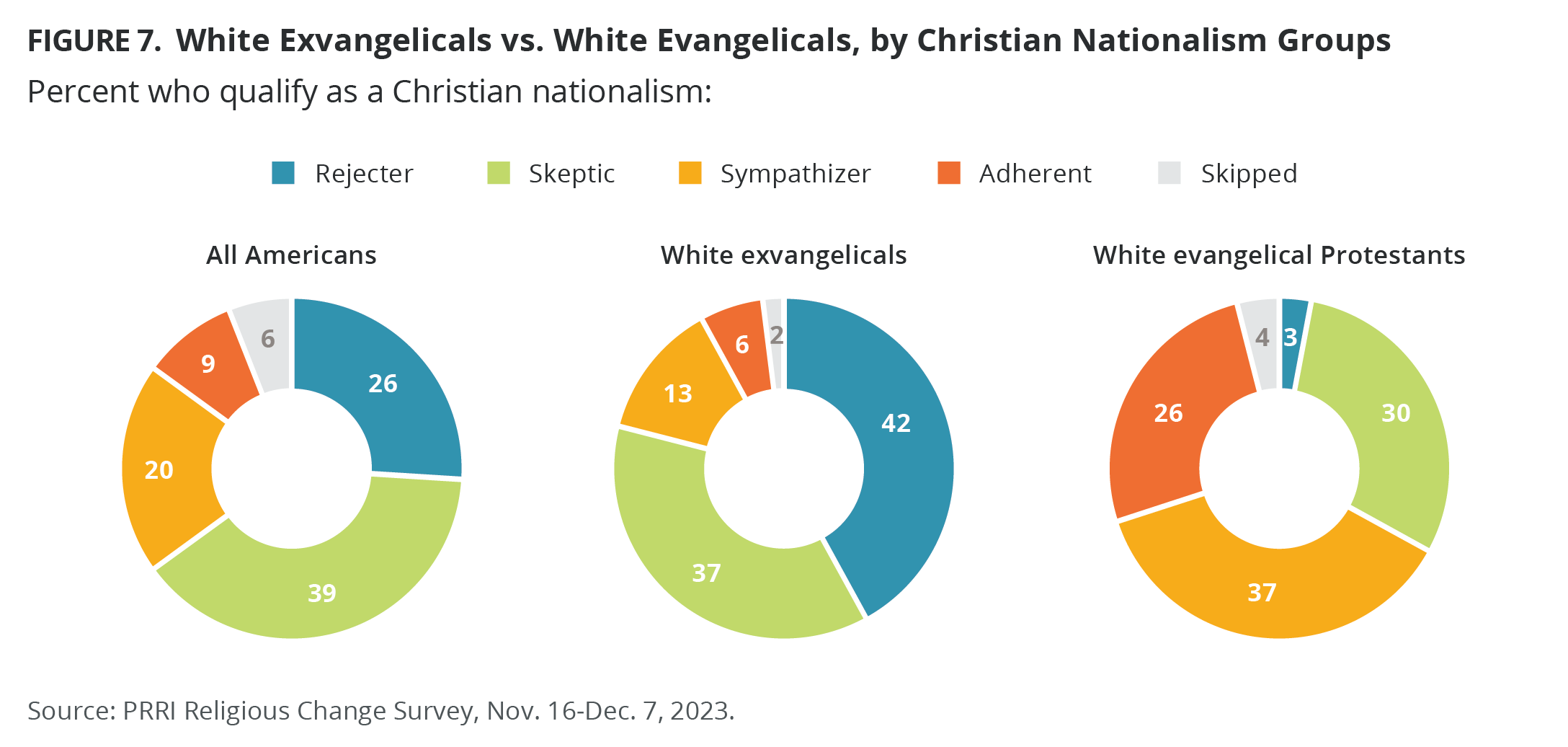In the 2010s, the term “exvangelical” emerged to refer to individuals who have left evangelicalism and who have chosen to join non-evangelical Christian traditions, embrace non-Christian beliefs, or leave religion entirely. The exvangelical community has gained visibility in recent years as former believers increasingly share their stories. While the reasons why exvangelicals left vary, they often cite disappointment with church teachings, particularly the treatment of LGBTQ people.
This Spotlight examines who identifies as exvangelical, the factors that contributed to their disaffiliation from evangelicalism, and their current views on a range of cultural issues.
Who Are Exvangelicals?
PRRI’s 2023 Religious Change survey asked Americans about their current religious affiliation and the religion in which they were raised. In addition, Christians were asked follow-up questions about whether they identify with or were raised as born-again or evangelical Christians. Based on these questions, we can identify those who grew up as evangelicals but no longer identify as such.
The survey data show that 6% of Americans are exvangelicals. Within that group, women (58%) are more likely than men (42%) to be exvangelical. Exvangelicals are more likely to be between 30-49 years old (33%), followed by those ages 50-64 (26%), ages 18-29 (24%), and seniors ages 65 or older (17%). A majority reside in the South (58%), with roughly one in ten or less living in the West (16%), Midwest (16%), and Northeast (11%). In addition, 14% identify as members of the LGBTQ community.
Politically, exvangelicals tend to identify more as independents (36%) than as Democrats (30%) or Republicans (22%). They are also more likely to identify as moderate (37%) than liberal (30%) or conservative (29%).

The majority of exvangelicals identify as white (56%), 23% as Black, 12% as Hispanic, 5% as other race, 3% as AAPI, and 1% as multiracial. Religiously, about half of exvangelicals currently identify as religiously unaffiliated (49%), followed by 18% who identify as white mainline/non-evangelical Protestants, 12% as Black Protestants, 11% as non-Christians, 6% as other Protestant of color (including Hispanic Protestants 2%), 3% as white Catholics, and 1% as Latter-day Saints.
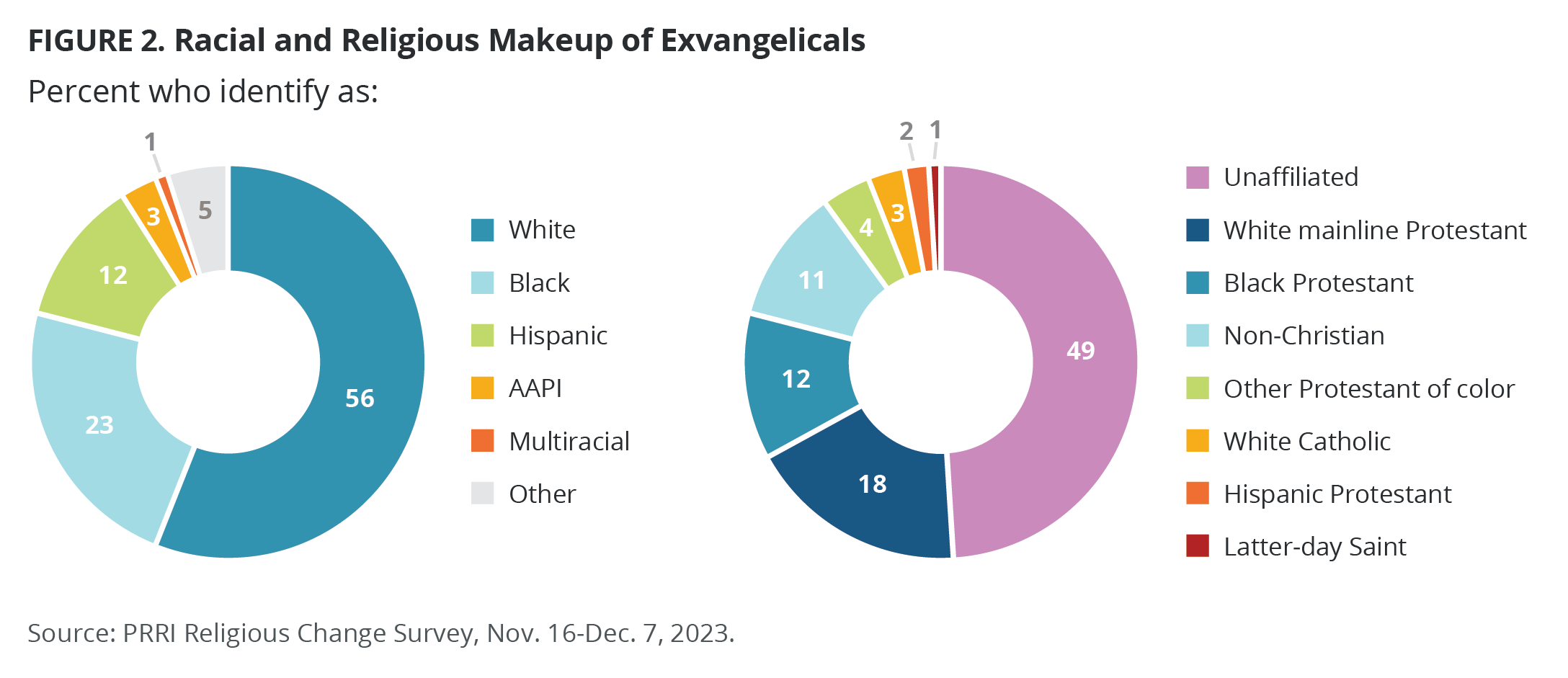
How Do White Exvangelicals Compare with White Evangelical Protestants
The remainder of this Spotlight focuses on the characteristics and views of white exvangelicals, who make up the majority of former evangelicals, how they differ from white evangelical Protestants, and how unaffiliated white exvangelicals differ from white unaffiliated Americans more broadly.
White exvangelicals tend to resemble the general U.S. population more closely than white evangelical Protestants. They are more likely to be between the ages of 30 and 49 (36% vs. 26%) and less likely to fall into older age groups, including ages 50–64 (23% vs. 30%) and 65 or older (22% vs. 27%). Both groups are similarly represented among young adults ages 18-29 (18% vs. 16%). While there are no differences by gender among white exvangelicals (49% men vs. 51% women), white evangelical Protestants are more likely to be women (54%) than men (46%).
White exvangelicals are twice as likely as white evangelical Protestants to hold a postgraduate degree (22% vs. 10%), while white evangelical Protestants are more likely to have a high school diploma as their highest level of education (42% vs. 32%). Similar proportions of white exvangelicals and white evangelical Protestants have some college experience (26% vs. 30%) or a college degree (20% vs. 18%).
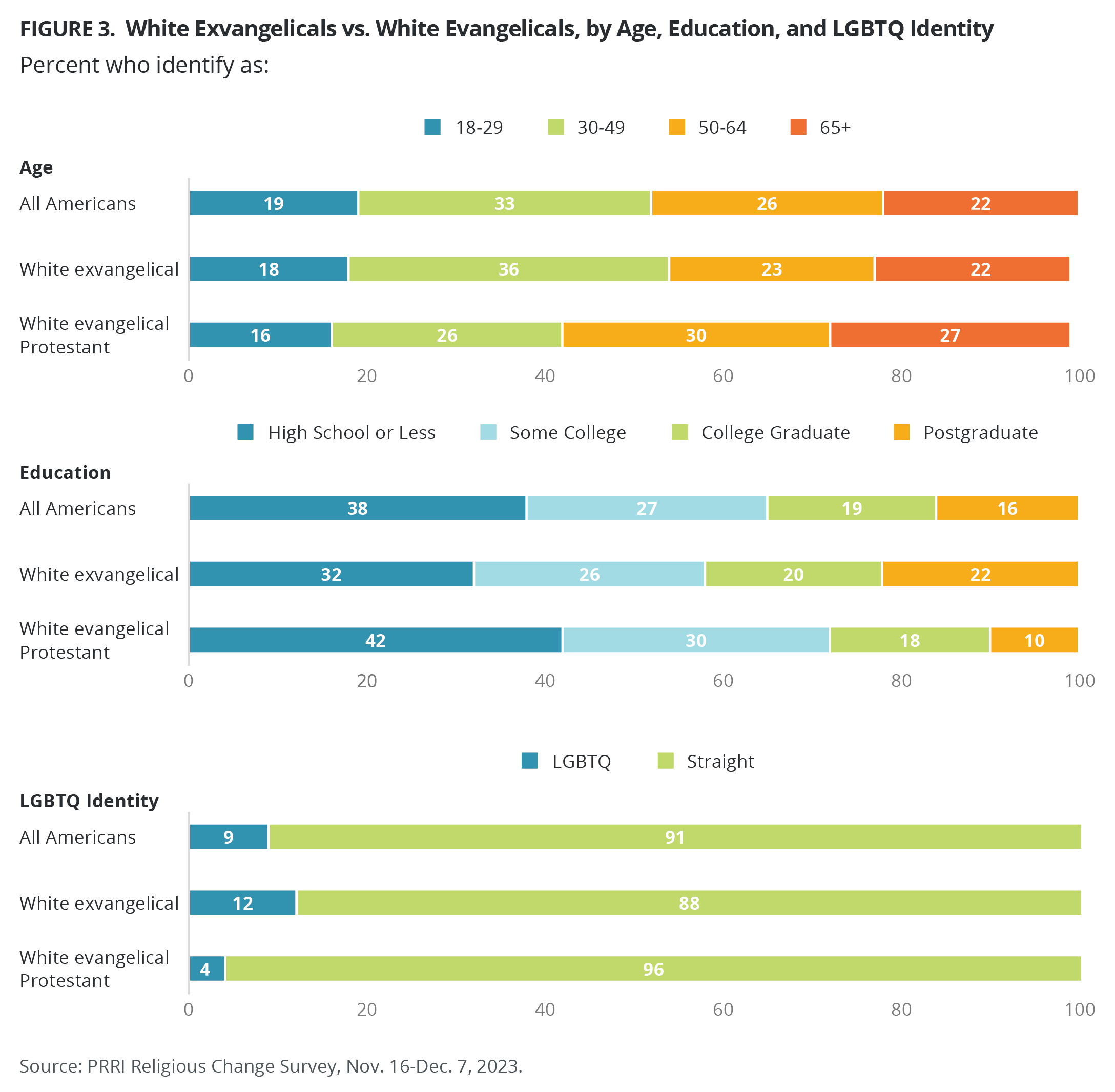
White exvangelicals are more likely than white evangelical Protestants to identify as Democrats (23% vs. 9%) and independents (35% vs. 23%), as well as liberal (34% vs. 9%) and moderate (31% vs. 22%). In contrast, white evangelical Protestants are almost twice as likely as white exvangelicals to identify as Republican (59% vs. 33%) and conservative (67% vs. 34%).
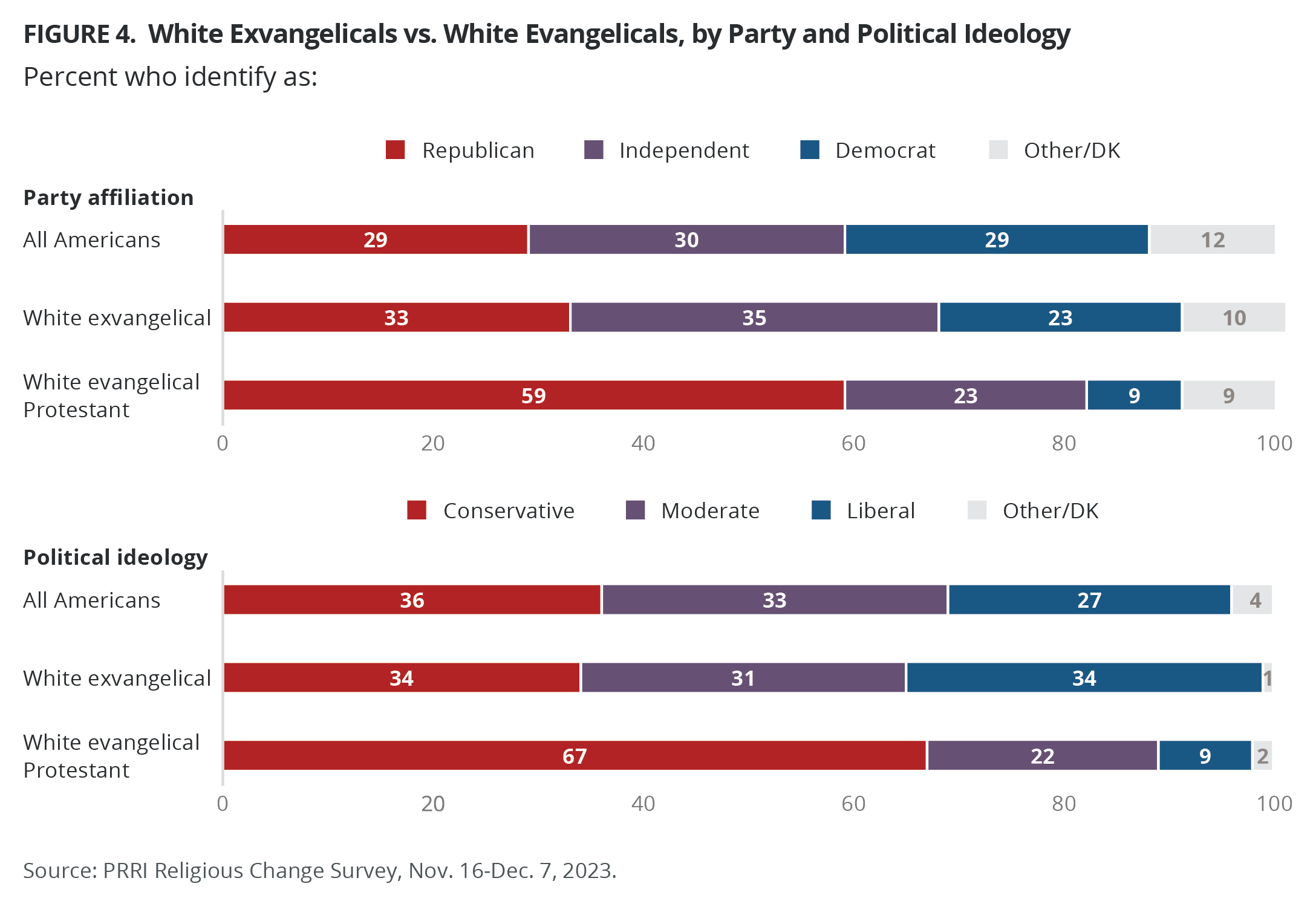
Why Unaffiliated White Exvangelicals Left Their Faith Tradition
PRRI finds that a strong majority of unaffiliated white exvangelicals cite no longer believing in their religion’s teachings as the primary reason they disaffiliated (80%). This is followed by 58% who point to negative religious teachings about or treatment of gay and lesbian people. Additionally, half say their religion was harmful to their mental health (51%). Around one-third say their church became too focused on politics (32%), their family was never particularly religious (30%), or they left due to clergy sexual abuse scandals (29%).
Compared with white, religiously unaffiliated Americans more broadly, white exvangelicals are significantly more likely to cite nearly all of these reasons for disaffiliation, with the exception of having grown up in a nonreligious family (30% vs. 41%) and clergy sexual abuse scandals (29% vs. 30%). White exvangelicals are also more than 10 percentage points more likely than other white unaffiliated Americans to cite negative religious teachings about or treatment of gay and lesbian people as a reason for leaving their religion (58% vs. 47%).
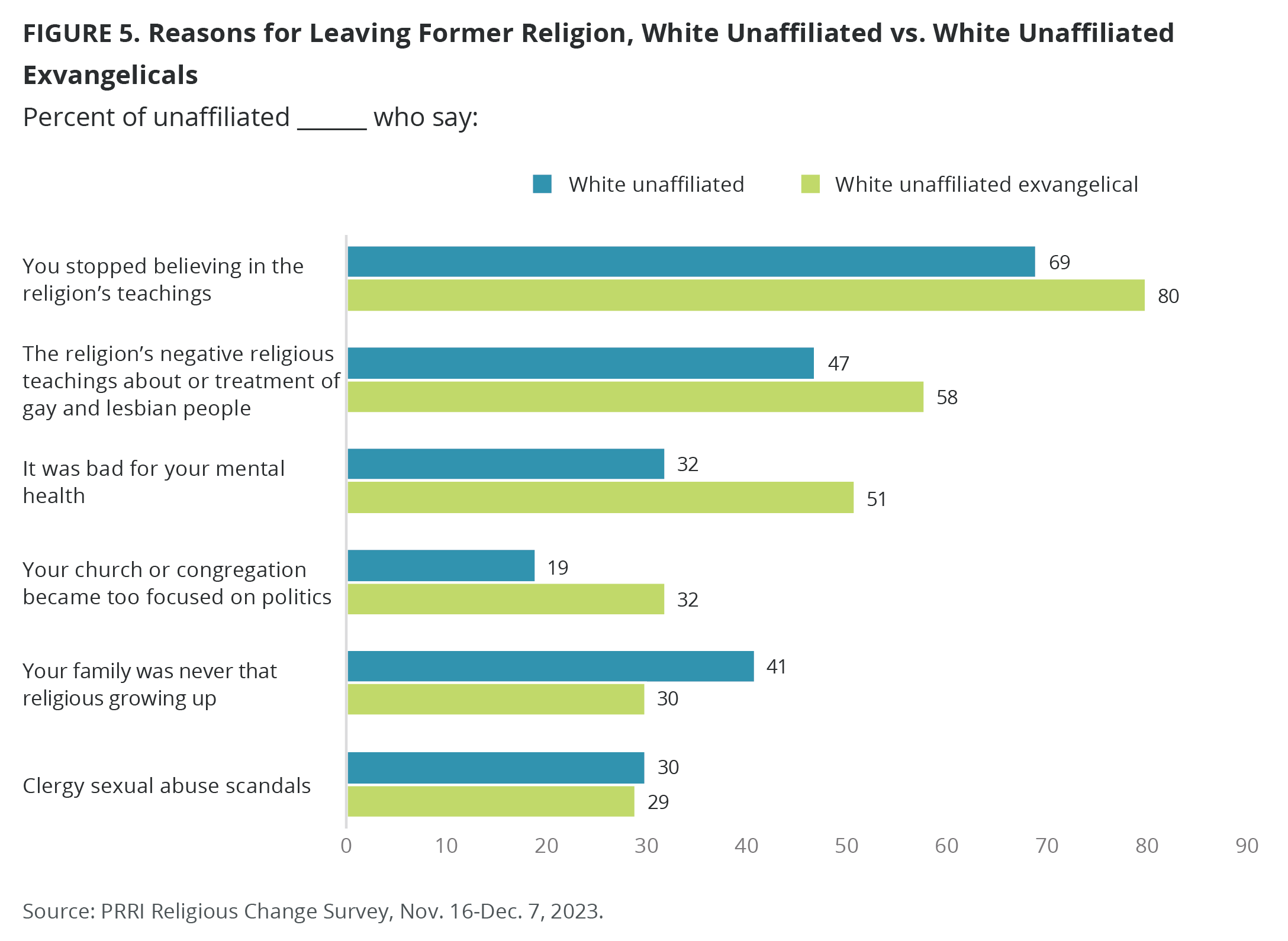
What Exvangelicals Believe
White exvangelicals are significantly more likely than white evangelical Protestants and all Americans to support LGBTQ and abortion rights. Solid majorities of white exvangelicals favor nondiscrimination protections for LGBTQ people (83%), support same-sex marriage (80%), and believe abortion should be legal (79%). Additionally, six in ten oppose allowing businesses to refuse service to LGBTQ people on religious grounds (60%). In contrast, support among white evangelical Protestants is substantially lower: only 36% favor same-sex marriage, 32% oppose religiously based service refusals, and just 27% support the legality of abortion. The only issue where a majority of white evangelical Protestants express support is for LGBTQ nondiscrimination protections (54%).
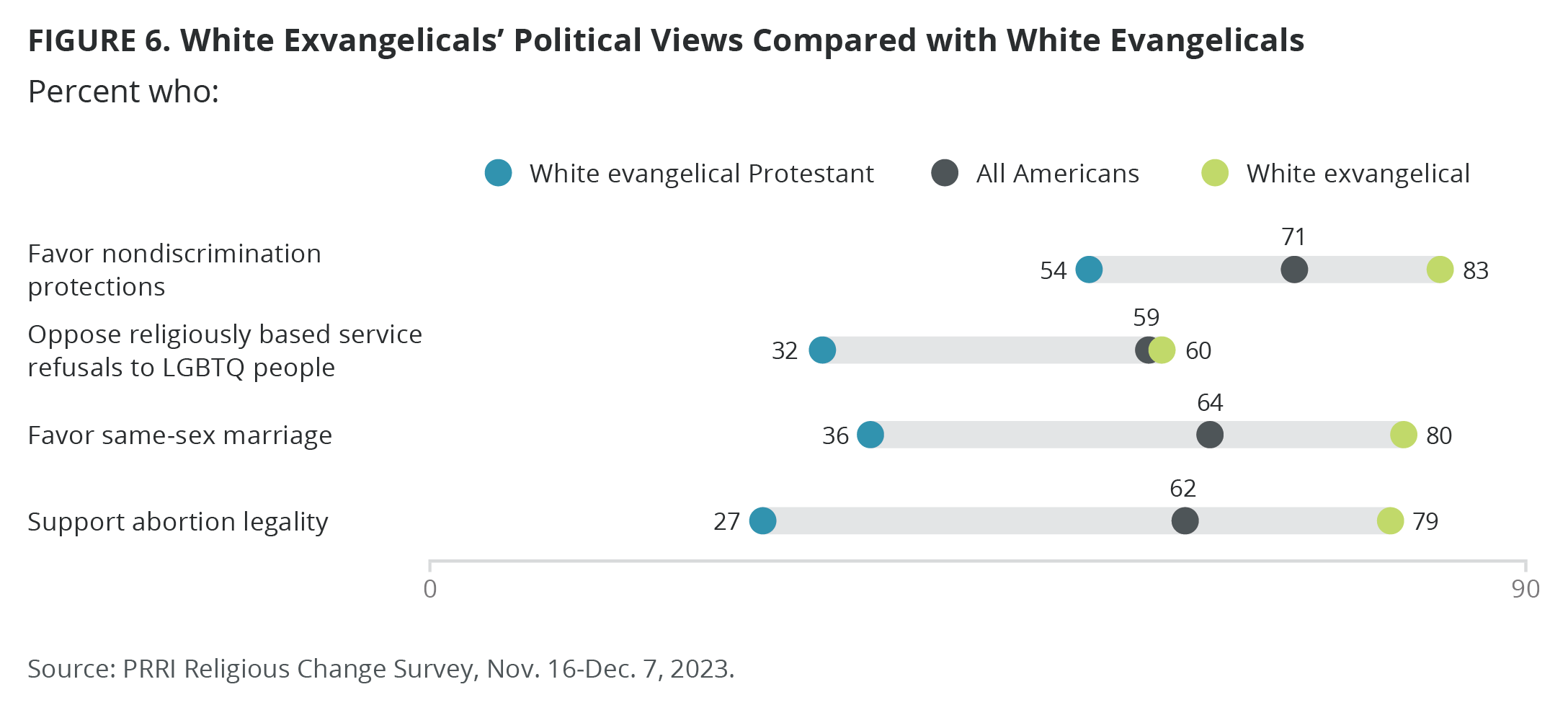
To measure Christian nationalism, PRRI uses a battery of five questions about the relationship between Christianity, American identity, and the U.S. government. White exvangelicals are notably more likely to qualify as Christian nationalism Rejecters (42%) and Skeptics (37%) than Sympathizers (13%) or Adherents (6%). By contrast, white evangelical Protestants are more likely to identify as Christian nationalism Adherents (26%) and Sympathizers (37%) than Skeptics (30%). Just 3% identify as Rejecters.
